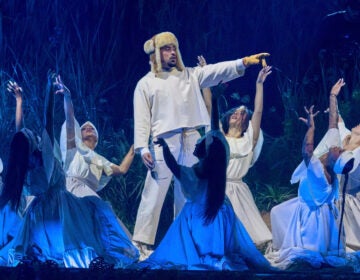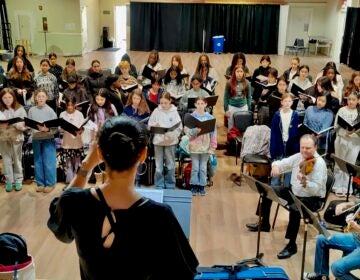Watch the livestream — and fully appreciate — Aretha Franklin’s funeral
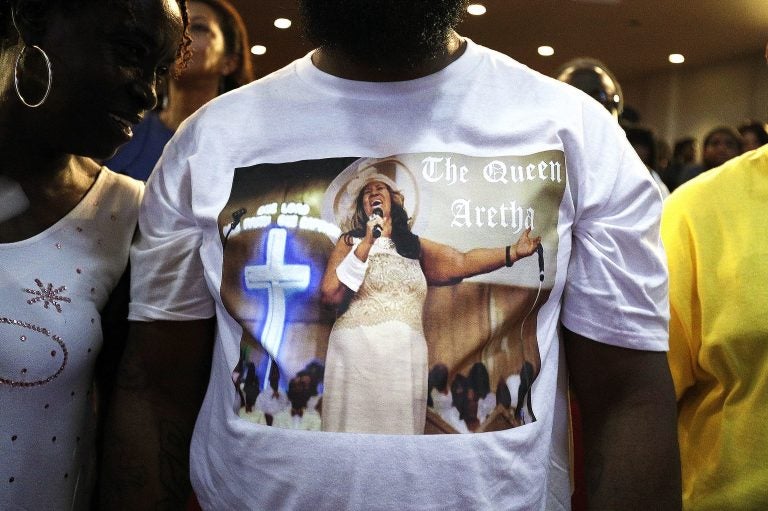
A man listens to Rev. Jesse Jackson speak Aug. 19 at New Bethel Baptist Church, the church where Aretha Franklin's late father Rev. C.L. Franklin was a minister and where she began her singing career. (Bill Pugliano/Getty Images)
Watch The Live Stream
Watch or listen to the funeral live on now via NPR.org.
Since Aretha Franklin’s death on Aug. 16, the world has memorialized the soul icon in fitting fashion — as a Queen. Her voice “captured the experience of living through profound change and showed how to preserve integrity in its wake,” as Ann Powers wrote, an example that can feel desperately absent in these times of turmoil, but one that remains just a memory away.
Franklin is on the cusp of being honored as American royalty. At 10 a.m. ET on Friday, Aug. 31 in Detroit, more than two dozen people — including heads of state, city and country, a record mogul, and music legends of nearly every description — will take the altar of the Greater Grace Temple at her homegoing to speak, sing and pray in honor of the gift that Franklin so readily shared with the world.
Here’s a list of every announced speaker or performer at Franklin’s homegoing, with some useful background on their history with Aretha or her work. You can watch or listen to the funeral live on this page, beginning Friday morning at 10 a.m.
SPEAKERS
Rev. Jasper Williams Jr.
The name may not ring familiar in the secular world, or even among those loosely attuned to the nation’s megachurch mavericks. But among the black Baptist stronghold, he’s a towering figure best known for a style of charismatic preaching as musical as Aretha Franklin’s own legacy. He’s a whooping preacher in the lineage of Franklin’s famous father, the Rev. C.L. Franklin of Detroit’s New Bethel Baptist Church, who popularized the rhythmic African-American oral tradition that stretches at least as far back as slavery. Among its present-day practitioners in the pulpit, Williams is among the last of a dying breed. His connection to the Franklin family stretches back decades as pastor emeritus of Atlanta’s Salem Bible Church, where he’s served for 55 years. The two Memphis-born ministers counted each other as friends in life, according to The Detroit News. And when Rev. Franklin died in 1984, following an extended coma resulting from an attempted robbery and shooting, Williams preached his eulogy. In grainy footage from the funeral service, you can hear him warming into his melodic intonation, each line punctuated with signature grunts and gasps. When he delivers Aretha Franklin’s eulogy this week, it’ll be as close as heavenly possible as having her own father sing her praises. —Rodney Carmichael
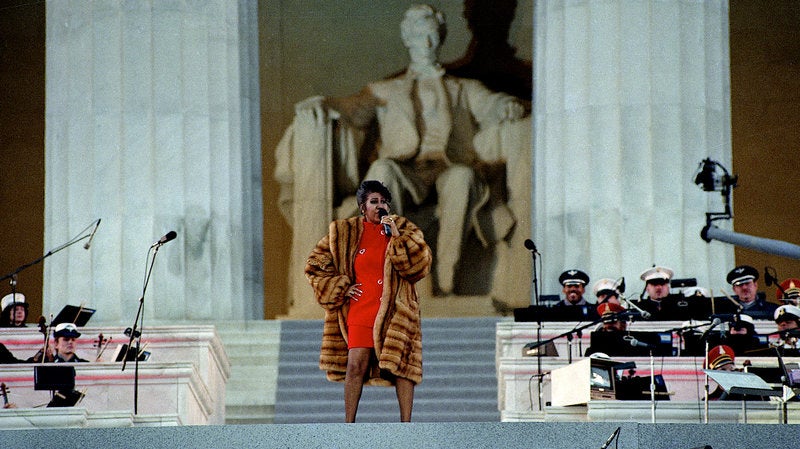
Bill Clinton
Aretha Franklin and former President Bill Clinton’s relationship goes back at least to 1993, when the Queen of Soul performed during the Call for Reunion concert on the National Mall, an event which kicked off Clinton’s inauguration week and which drew a then-record-setting crowd of some 1 million people. (Franklin was chastised by PETA for wearing a mink coat while performing in the January cold.) In 1999, Clinton presented Franklin with the National Medal of Arts, the highest art-specific honor the U.S. government awards. —Andrew Flanagan
Jesse Jackson
As a young lieutenant in Dr. King’s army, civil rights leader Jesse Jackson had a bird’s eye view of Aretha Franklin’s commitment to the movement. The Sunday after her death, Jackson stepped to the podium at Detroit’s New Bethel Baptist — the sanctuary built by her father in 1963 – and recalled the time she went on an 11-city tour with Harry Belafonte only to donate the entire proceeds to a nearly-bankrupt Dr. King. “It’s hard to let her go,” an emotional Jackson told local reporters after exiting Aretha Franklin’s public viewing Tuesday at the Charles H. Wright Museum for African American History. “I remember the first night her dad asked her to sing ‘Never Grow Old’ in a church in 1958. She’s been a singing sensation for 60 years, and a servant.” —Rodney Carmichael
Al Sharpton
Before Al Sharpton became a civil rights stalwart and preacher, he worked as James Brown’s manager and considered the Godfather of Soul his surrogate father. Together, Sharpton and Franklin represent an era when the degrees of separation between activists, entertainers and the clergy were practically nonexistent in the black community. He recently recalled fond memories of visiting Franklin’s dressing room after big concerts, where there was always sure to be soul food and fellowship on hand. “It took us a long time to get a black president, but we always had a queen — one that represented us and represented others all over the world,” he said on MSNBC two days after her death. “That queen was Aretha Franklin.” —Rodney Carmichael
Eric Holder
In April 2015, then-Attorney General Eric Holder beamed as Aretha Franklin approached the stage at the U.S. Department of Justice. Franklin was the surprise guest at Holder’s farewell ceremony, an event that marked Holder’s six-plus years of service as the government’s top lawyer. Holder bowed, Franklin curtsied. They hugged. The humility and mutual respect for one another was obvious. Franklin went on to sing a joyous rendition of “America The Beautiful,” which ended with her own personal remarks over the closing vamp, “Mr. Attorney General, Eric Holder, speaking for we the people, we appreciate you, we love you — and God bless and keep you as you go forward in all of your endeavors.” —Suraya Mohamed
Brenda Lawrence
Aretha Franklin and State Representative of Michigan’s 14th Congressional District Brenda Lawrence had, according to Lawrence, “been friends for some time” when, in 2014, Franklin publicly endorsed Lawrence’s congressional campaign. Prior to that, Lawrence had served as the mayor of Southfield, a northern suburb of Franklin’s beloved Detroit. Three years after being elected to Congress, Lawrence seized the occasion of Women’s History Month in March 2017 to recognize Franklin on the House floor. —Andrew Flanagan
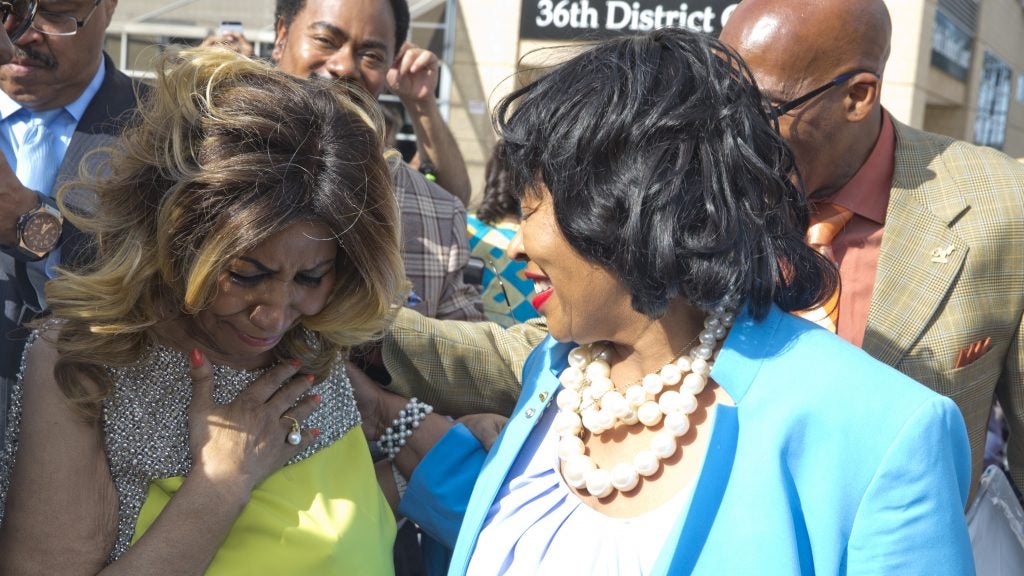
Michael Eric Dyson
The Georgetown professor knew the Queen of Soul for 15 years and was pleasantly surprised to learn that she was an avid reader and a bit of a comedian upon first meeting her. After her death, Dyson wrote about Franklin for the New York Times, particularly about the sanctity of her voice, and recalled watching her perform for the Pope in 2015 in a recent interview on NPR’s Morning Edition: “There have been many popes. Ain’t but one Aretha Franklin.” —Sidney Madden
Clive Davis
She became the definitive Queen of Soul on Atlantic Records, but it was through Clive Davis’ Arista Records that Aretha Franklin extended her legend across generations. With such hits as “Freeway of Love,” “Jump to It” and her George Michael duet “I Knew You Were Waiting For Me,” Franklin would become an enduring presence for ’80s babies, too. But it was her studio ethic, Davis recently recalled in Billboard, that set Franklin apart from other recording artists. “Most artists go into the studio for a week, a month, and some — without naming names — go for months until they get the right performance. Aretha is a perfectionist. She comes fully rehearsed to the studio. She nails it at that same session. She never does more than three takes. She comes [in after] living with the song before she goes in the studio.” —Rodney Carmichael
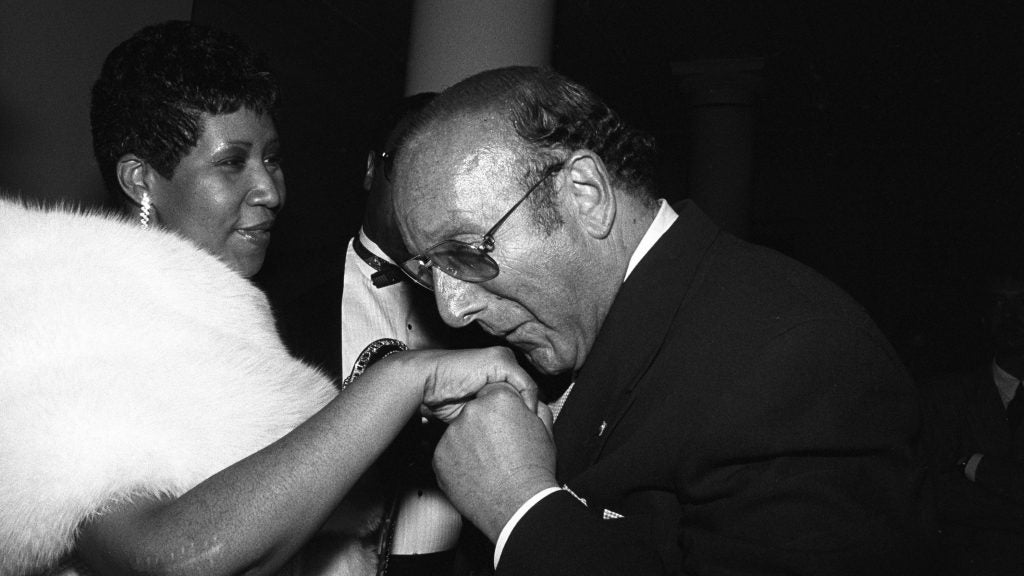
Cicely Tyson
Cicely Tyson’s film, television and stage career spans six decades, but in addition to her award-winning acting career, she shares with Aretha Franklin the title of education and civil rights advocate. In 2015, Tyson was awarded a Kennedy Center Honor — the same night that Aretha Franklin brought the house down in honor of Carole King. —Lauren Onkey
T.D. Jakes
When it comes to the black prophetic tradition, there is no pastor more prolific today than T.D. Jakes and his Dallas-based Potter’s House ministry. Time once branded him “America’s preacher,” and having his counsel and the support of his 30,000-member congregation sought by U.S. presidents on both sides of the political aisle bears that out. Jakes also counted Aretha Franklin as “a friend to this ministry,” as he posted in a tweet two days before her death, while crediting her for “[t]ranscending social barriers and racial divides.” —Rodney Carmichael
Greg Mathis
Best known for his daytime TV role as Judge Greg Mathis, this Detroit native called Aretha Franklin a close friend over many years. “We vacationed together and visited with each other,” he told Extra TV after the Queen’s passing. “The last time I spoke to her was six months ago. We communicated with each other recently, and she suggested we go on a vacation again. Her spirits were still high.” —Rodney Carmichael
Mike Duggan
Detroit Mayor Mike Duggan, who assumed office in 2014, honored Franklin in her lifetime in a classically mayoral manner, presenting Franklin with the key to her hometown city during her performance at Detroit Music Weekend festival on June 10, 2017, one of her last performances in the city. —Sidney Madden
Brenda Jones
Jones was elected president of the Detroit City Council in 2014 and worked with Franklin on two local projects last year. In June 2017, Jones commandeered an effort to name a three-block stretch of Detroit’s arts district Aretha Franklin Way. The following month, Jones and Franklin teamed up to award Smokey Robinson a City of Detroit award. —Otis Hart
Bishop Charles H. Ellis
Ellis is the pastor of the Greater Grace Temple, where he’s led sermons since 1996. In 2005, his church hosted Rosa Parks’ funeral and it was Ellis who delivered her eulogy. Ellis will serve as co-officiant of Franklin’s funeral with the New Bethel Baptist Church’s Rev. Robert Smith, Jr. —Otis Hart
Gov. Rick Snyder
Rick Snyder has served as the governor of Michigan since 2011 (and since has perhaps become most widely associated with the Flint water crisis). After Franklin’s death, Snyder shared condolences on Twitter, writing, “”The world has lost an incredible talent and musical icon. One of Detroit’s greatest residents, Aretha will long be remembered as the ‘Queen of Soul’ and her presence will be missed dearly.” —Sidney Madden
PERFORMERS

Stevie Wonder
Stevie Wonder and Aretha Franklin have, of course, known each other for decades, performing together many times over the years. Wonder co-wrote Franklin’s 1973 hit, “Until You Come Back to Me (That’s What I’m Gonna Do).” In her retirement announcement last year, Franklin told Detroit’s NBC affiliate that she was working on a new album of original songs, including some produced by Wonder. (That project has not yet been released.) —Lauren Onkey
Chaka Khan
Chaka Khan, whom Franklin often described as a friend, emerged in the 1970s with Rufus, an influential funk-soul band with a string of hits. Clearly influenced by Franklin, Khan went on to a solo career that led to the 1978 hit “I’m Every Woman,” which was recorded by Franklin on Aretha Franklin Sings the Great Diva Classics (2014). Khan also performed at the Rock and Roll Hall of Fame’s 2011 American Music Masters tribute to Franklin. —Lauren Onkey
Fantasia
American Idol can claim only a few true inheritors of Franklin’s legacy as winners; 2004 champion Fantasia Barrino is perhaps the most in touch with the legend’s down-home soul. Barrino has paid the Queen tribute at various galas over the years, including a 2008 Grammy event where Franklin breezed by her table, offered her compliments, and added, “You can sing, but I’m the b**** around here.” —Ann Powers
Jennifer Hudson
After becoming a symbol of American injustice when she was voted off American Idol too soon, Hudson went on to win an Academy Award (in 2007, for Dreamgirls) and embody classic elegance in R&B. Her regal alto makes her a regular at tributes and memorials, but she’ll likely claim a featured spot at Franklin’s — in part because in January she was announced as the actress to play the Queen in an upcoming MGM biopic. —Ann Powers
Yolanda Adams
After establishing herself in the gospel world in the 1990s, Yolanda Adams became an emissary to the mainstream in the 2000s, her silky-strong voice earning her comparisons to that of Franklin’s goddaughter Whitney Houston, and to Franklin herself. Adams was a standout in a tribute to Franklin at the 2011 Grammy Awards, and will likely make a mark again honoring the Queen at this year’s BET Black Girls Rock! show, to be aired Sept. 9. —Ann Powers

Shirley Caesar
One of the few remaining titans from the Golden Age of Gospel that laid the foundation for Franklin’s musical approach, the 79-year-old Caesar was a lifelong friend of Aretha. Franklin often cited Caesar, who rose to fame as part of her favorite gospel group The Caravans, as a personal inspiration. She even once said that if she were ever to overcome her famous fear of flying, Caesar would be her companion on the flight. (That never came to pass). —Ann Powers
The Clark Sisters
Known for a dynamic style incorporating preacherly elements, jazz-like vocalizing and magical harmonies, the Detroit-based Clark Sisters became major players in the gospel arena in the 1980s. Blending Pentecostal fervor with dance beats and even hip-hop, the Clarks did in gospel what Franklin did in the secular realm. Franklin was a family friend of their mother, Mattie Moss Clark, a pioneering songwriter, performer and conductor famed for introducing three-part harmony to the gospel choir world. In 1994, Franklin sang “I’ll Fly Away” at Mattie’s funeral, so it’s only fitting that her daughters return the tribute here. —Ann Powers
Ariana Grande
As Tasha Cobb-Leonard will do for gospel, Ariana Grande will represent the pop vanguard at Franklin’s service. The pint-sized powerhouse and current chart-topper presumably earned her spot after posting several heartfelt tributes on Instagram and performing a tender version of “(You Make Me Feel Like) A Natural Woman” with the Roots on Jimmy Fallon’s Tonight Show. Grande is not a total stranger to the Franklin family; she met the Queen when both performed for the Obamas as part of a 2014 White House “Women of Soul” program, and Franklin took a shine to her. —Ann Powers
Faith Hill
Faith Hill’s voice, her chart dominance and her country/pop crossover is Aretha-style ambition and skill. She has previously performed Franklin’s “Dr. Feelgood” and her George Michael duet, “I Knew You Were Waiting” with her husband, Tim McGraw in concert. —Lauren Onkey
The Williams Brothers
The Williams Brothers have been together through several iterations since 1960, although they didn’t record their first album until 1974. They have accumulated many Dove and Stellar awards and are members of the International Gospel Music Hall of Fame. In recent years, they performed with Aretha Franklin at several gospel shows, including The Gospel Tradition: In Performance at the White House in 2015 and at her last performance in Detroit in June 2017, where they performed “Precious Memories” together at the Detroit Music Weekend festival. “The Williams Brothers and I always hit it off in song,” she said of the White House performance. —Lauren Onkey

Audrey DuBois Harris
When Aretha Franklin couldn’t perform at Jesse Jackson’s Rainbow Push Coalition last summer, she sent in a substitute: Audrey DuBois Harris, an internationally acclaimed singer with a supreme mastery of both classical and gospel genres. Harris was such a fine stand-in for the Queen that Jesse Jackson mentioned her on CNN after Franklin’s death: “[Aretha Franklin] sent in a tremendous opera artist to stand in for her … because her range was from Juilliard to the small church.” Jackson remembered Franklin not only for her musical excellence, but also because she diligently used her platform to help emerging talent, like DuBois Harris, make it onto the big stage. —Suraya Mohamed
Ronald Isley
“You know, we go back a long way,” Aretha Franklin can be heard ad-libbing to Ronald Isley on their 2010 cover of the Carole King classic, “You’ve Got a Friend.” Their friendship dates back to 1962, when the Isley Brothers were enjoying their first hit with “Twist & Shout” and Franklin was just getting started at her first label home, Columbia Records. Isley joined Franklin, whom he called his “best friend,” onstage in 2011 alongside former Temptations’ lead Dennis Edwards. Together, they performed “A Song For You” (written by Leon Russell and later recorded by Donny Hathaway) at a Rock and Roll Hall of Fame tribute concert for the Queen. Today, Isley is the only surviving member of the three. —Rodney Carmichael
Edward Franklin
The second of Aretha’s four children, called ‘Eddie’ by the Queen of Soul, is a spirit singer just like his mother. Though he has not released solo material of his own, Eddie has performed with his mother a number of times and has proven he possesses the range required to hit the high notes. (Aretha always encouraged her children to pursue their musical dreams.) —Sidney Madden
Jennifer Holliday
The original Effie White, who swept the Tony awards as a teenager in 1982 for her Dreamgirls turn, Jennifer Holliday became friends with Franklin around that time. The Queen attended her performance and, according to Holliday, wrote her a praiseful note on a matchbook from the theater’s bar. In recent years, Holliday has released both Christian and secular music, and she returned to Broadway in 2015 to play Shug in The Color Purple. —Ann Powers
Tasha Cobbs-Leonard
The most-streamed artist in gospel music today, Tasha Cobbs-Leonard represents the vanguard of the genre. Her 2013 blockbuster single “Break Every Chain” epitomizes the blending of choir-driven worship music and classic gospel soloing that thrills congregations (and wins Grammy awards) today. Expect Cobbs-Leonard to lead a choir – perhaps her own, from Greenville South Carolina’s Relentless Church – in Franklin’s honor. —Ann Powers
Vanessa Bell Armstrong
Asked in an interview what her secret to longevity in the gospel world has been, the now-64-year-old Armstrong, a Detroit native who released her first album, Peace Be Still, in 1983, cited the Queen of Soul. “All I wanted to do was sing for God. I knew I had it in me and God endowed me with it … I thought I was Aretha Franklin for the longest time until I realized there’s only one,” Armstrong said, in reference to Franklin’s secular work. (To wit: The writer Nelson George recently observed that Franklin “could get as gutbucket as a bluesman and as sensual as a bordello bedroom.”) —Andrew Flanagan
Alice McAllister Tillman
Alice McAllister Tillman, a gifted soprano and longtime Detroiter, is the artistic director of the Brazeal Dennard Chorale, a choral group devoted to the preservation of African-American spiritual music. She’s also an accomplished educator who has taught vocal music at Michigan public schools. —Otis Hart
Bishop Marvin Sapp
“I’m so honored to have the honor to honor the Queen of Soul,” wrote Marvin Sapp — a Michigan native with deep ties to the church — after receiving the invitation to perform at Aretha Franklin’s funeral. The talented pastor, singer and hugely successful recording artist’s 2007 hit, “Never Would Have Made It,” spent a record-setting 46 weeks at the top of the Hot Gospel Songs chart. As of this writing he has another song, “Listen” on that chart — along with four of Franklin’s finest: “Mary Don’t You Weep,” “Precious Lord (Take My Hand)/You’ve Got A Friend,” “Amazing Grace” and “What A Friend We Have In Jesus.” After his wife of 20 years tragically died from cancer, he told NPR in 2012: “What I’ve learned is that the best way to honor someone that has passed on is to live.” —Suraya Mohamed
9(MDAzMzI1ODY3MDEyMzkzOTE3NjIxNDg3MQ001))


